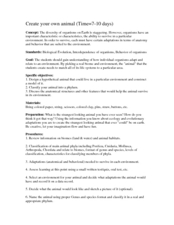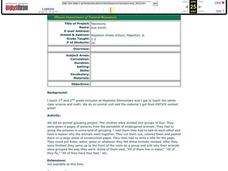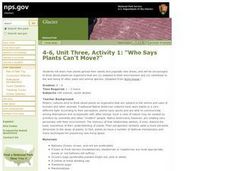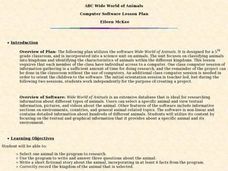Curated OER
Learning About Mammals
Students study the mammal classification and forms of them living in the United States. In this mammal study instructional activity, students read through orders of mammals that exist in the United States. Students also study the...
Curated OER
Do You Really Need It?
A large part of understanding personal finance and economics is grasping the concept of wants and needs. This presentation provides students with basic yet effective definitions of wants, needs, and how they effect advertisements and...
Curated OER
Poriferans and Cnidarians
Students study the major phyla of the animal kingdom. In this biology lesson unit, students identify their general characteristics. They define taxonomy terminologies.
Curated OER
A Wild Family Album!
Students create a scrapbook style family album for a selected animal. They complete an interactive Internet activity on research reports, fill out a graphic organizer, diagram a food web, and complete their scrapbook that includes...
Curated OER
Create Your Own Animal
Students design and create their own hypothetical animal. In this biology lesson, students identify the factors organisms need to survive. They classify their animals according to its correct phylum.
Curated OER
The Animals Kingdom
Students are introduced to the classification system of animals. In groups, they set up an aquarium in which they must maintain throughout the year. They also observe earthworms and how they react to various stimuli and research the...
Curated OER
Classy
Students explore the classification system in this seven lessons unit. The diversity of life forms and their characteristics are examined using a microscope. Kingdoms, classes, and families are investigated.
Curated OER
"Zoophyla"
Ninth graders gain an understanding of organims based on charateristics. They study about Kingdom Animalia and use technology to present knowledge of phyla. Finally, they create a new animal species of their own. When others present,...
Curated OER
Classify UT Plants and Animals
Students practice using 2 different plant classification keys to identify species. They make choices between the similarities and differences between their object and the classification scheme.
Curated OER
Charlie and the Cell City
Students identify the major components of the cell and their functions. They compare and contrast the major components and functions of animal and plant cells
Curated OER
Taxonomy
Students work together to identify groups of endangered animals. Using a pamphlet, they group the pictures according to specific criteria and cut the pictures out and color them. They place the animals in the correct habitat and share...
Curated OER
Creative Classification
Students create an animal by using physical characteristics to classify that animal in the Linnaean Classification System. This lesson is part of a multi-segmented unit on the diversity of life.
Curated OER
Tackling Taxonomy
Students study physical characteristics of separate phyla and place them into similar groups. This lesson plan is part of a multi-segmented unit on the diversity of life. students develop a classification system by grouping animals into...
Curated OER
Mammal Study Merit Badge Workbook
In this Boy Scout Mammal Study merit badge activity, students complete 5 pages of multiple step short answer questions associated with the characteristics of mammals in order to earn a merit badge. They list animal classification, follow...
PreKinders
Insect Picture Word Cards
Creepy crawly insects! Learn the names of 12 different insects, including ladybugs, cicadas, and katydids. Each card features a picture of the insect as well as its name in large letters.
Curated OER
Goals of the Diversity of Life Unit
Students are introduced to the unit on the importance of diversity of life and the role that interdependence plays in our worlds. this is part of a multi-lesson unit on the diversity of life.
Curated OER
What's the Difference?
Students analyze the similarities in different species. This lesson is part of a multi-segmented unit on the diversity of life. In this segment, students classify shoes to mimic the scientific categories of the classification system.
Curated OER
Who Says Plants Can't Move?
Learners discover how plants spread their seeds using other plants and animals. In this plant lesson, students role play different plants and how their seeds travel. Learners then have a class discussion to ensure their understanding.
Curated OER
ABC Wide World of Animals
Fifth graders use the software Wide World of Animals. This lesson is incorporated into a science unit on animals. The unit focuses on classifying animals into kingdoms and identifying the characteristics of animals within the different...
Curated OER
Classification of Animals
First graders investigate the characteristics of vertebrates. They classify each as mammal, fish, bird, and reptiles. Students explore the differences between various types of animals and classify each.
Curated OER
Collared Peccary (Javelina)
In this animal facts learning exercise, students learn about the only wild, native, pig like animal found in the United States. Students learn facts about the Collard Peccary by reading the learning exercise.
Curated OER
Kingdom Animalia
Students are introduced to the basic characteristics of the animal kingdom. this lesson is part of a multi-segmented unit on the diversity of life. In this segment, students explore the the members of a few phyla of the animal kingdom.
Curated OER
Species Diversity in Ecosystems with Different Techniques of Land Management
Young scholars visit numerous places to help in their understanding of Ecology. In this biology lesson plan, students will learn about characteristics and how to identify numerous plants and animals. This lesson allows for many field...
Curated OER
Charlie and the Cell City
Students investigate the major components of the cell and their function through an adventure inside the cell with an imaginary little guy named "Charlie." Through the use of the Internet and viewing a video, students identify components...

























